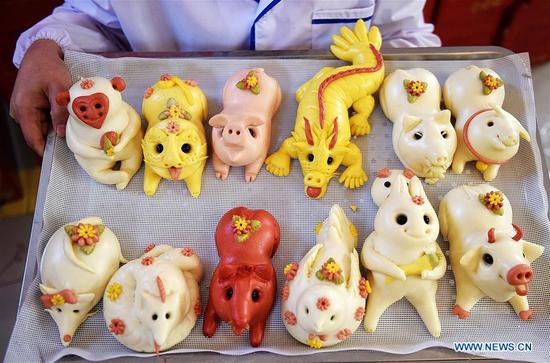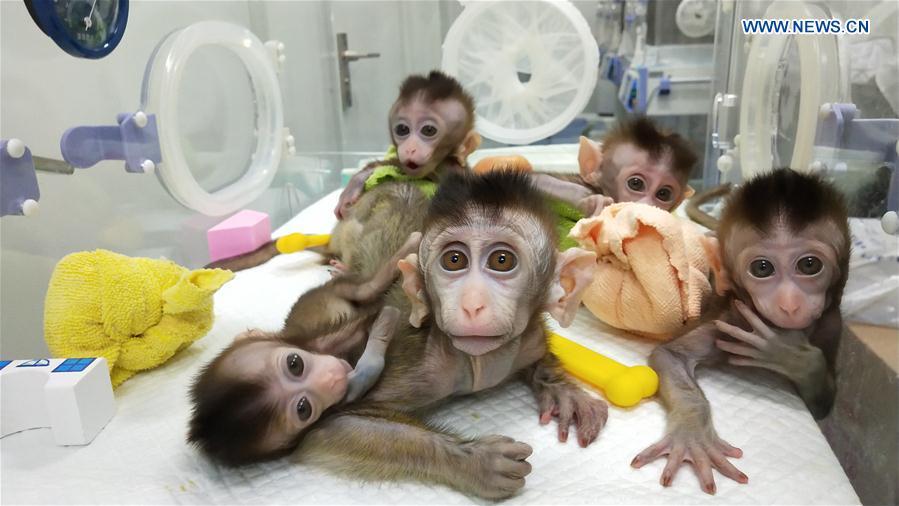
Photo taken on Nov. 26, 2018 shows the five cloned monkeys with circadian rhythm disorders. China has cloned five monkeys from a gene-edited macaque with circadian rhythm disorders, the first time multiple monkeys have been cloned from a gene-edited monkey for biomedical research. Scientists made the announcement Thursday, with two articles published in National Science Review, a top Chinese journal in English. The cloned monkeys were born in Shanghai at Institute of Neuroscience of Chinese Academy of Sciences. (Xinhua/Institute of Neuroscience of Chinese Academy of Sciences)

Zhang Hongjun, a researcher of the Institute of Neuroscience of Chinese Academy of Sciences, introduces relative research achievements about the cloned monkeys at a press conference in Shanghai, east China, Jan. 23, 2019. China has cloned five monkeys from a gene-edited macaque with circadian rhythm disorders, the first time multiple monkeys have been cloned from a gene-edited monkey for biomedical research. Scientists made the announcement Thursday, with two articles published in National Science Review, a top Chinese journal in English. The cloned monkeys were born in Shanghai at Institute of Neuroscience of Chinese Academy of Sciences.(Xinhua/Jin Liwang)
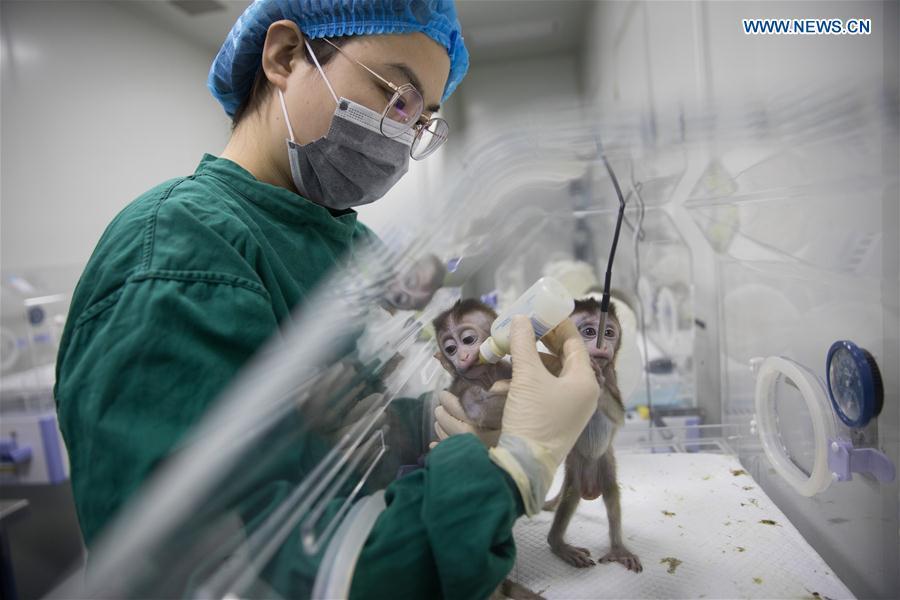
A staff member feeds cloned monkeys with circadian rhythm disorders at the Institute of Neuroscience of Chinese Academy of Sciences in Shanghai, east China, Jan. 22, 2019. China has cloned five monkeys from a gene-edited macaque with circadian rhythm disorders, the first time multiple monkeys have been cloned from a gene-edited monkey for biomedical research. Scientists made the announcement Thursday, with two articles published in National Science Review, a top Chinese journal in English. The cloned monkeys were born in Shanghai at Institute of Neuroscience of Chinese Academy of Sciences. (Xinhua/Jin Liwang)
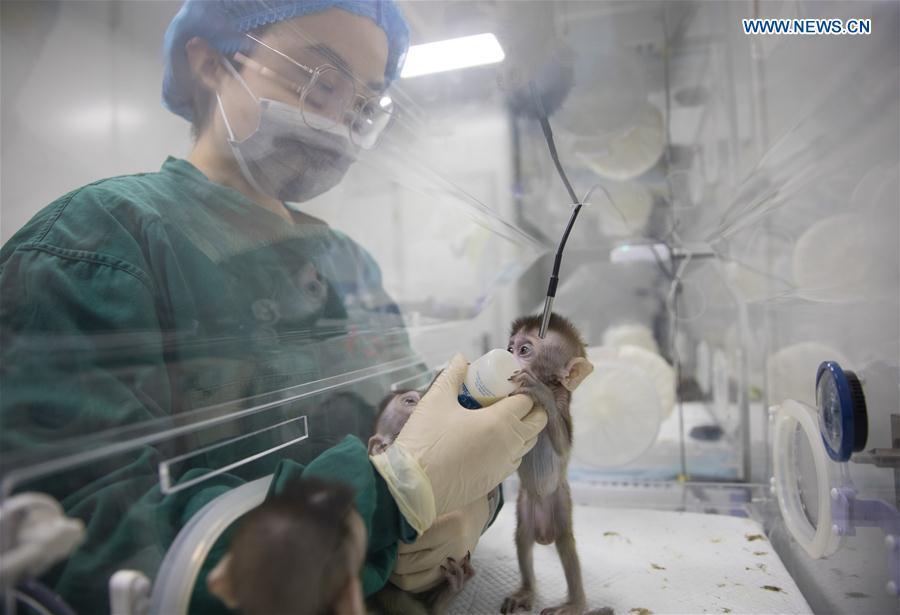
A staff member feeds a cloned monkey with circadian rhythm disorders at the Institute of Neuroscience of Chinese Academy of Sciences in Shanghai, east China, Jan. 22, 2019. China has cloned five monkeys from a gene-edited macaque with circadian rhythm disorders, the first time multiple monkeys have been cloned from a gene-edited monkey for biomedical research. Scientists made the announcement Thursday, with two articles published in National Science Review, a top Chinese journal in English. The cloned monkeys were born in Shanghai at Institute of Neuroscience of Chinese Academy of Sciences.(Xinhua/Jin Liwang)
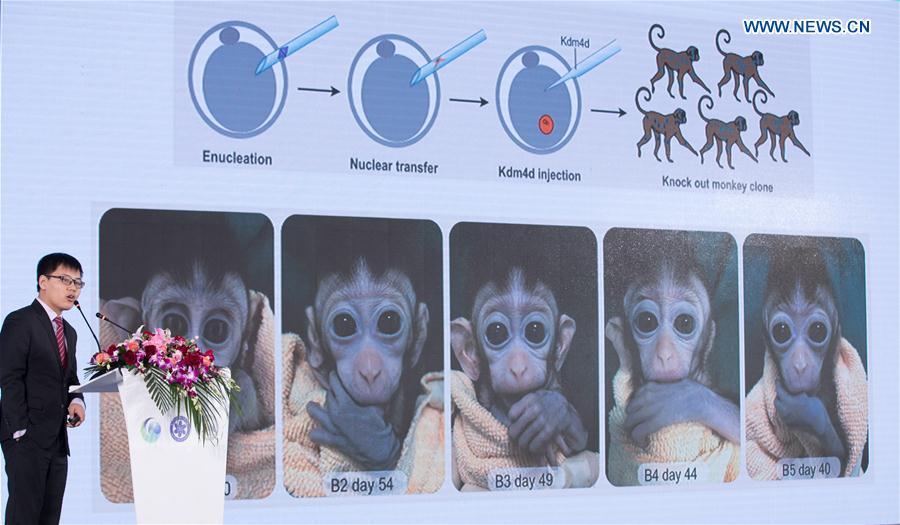
Liu Zhen, a researcher of the Institute of Neuroscience of Chinese Academy of Sciences, introduces relative research achievements about the cloned monkeys at a press conference in Shanghai, east China, Jan. 23, 2019. China has cloned five monkeys from a gene-edited macaque with circadian rhythm disorders, the first time multiple monkeys have been cloned from a gene-edited monkey for biomedical research. Scientists made the announcement Thursday, with two articles published in National Science Review, a top Chinese journal in English. The cloned monkeys were born in Shanghai at Institute of Neuroscience of Chinese Academy of Sciences. (Xinhua/Jin Liwang)

A gene-edited macaque which researchers knocked out BMAL1, a core circadian regulatory transcription factor, interacts with staff members at the Institute of Neuroscience of Chinese Academy of Sciences in Shanghai, east China, Jan. 22, 2019. China has cloned five monkeys from a gene-edited macaque with circadian rhythm disorders, the first time multiple monkeys have been cloned from a gene-edited monkey for biomedical research. Scientists made the announcement Thursday, with two articles published in National Science Review, a top Chinese journal in English. The cloned monkeys were born in Shanghai at Institute of Neuroscience of Chinese Academy of Sciences. (Xinhua/Jin Liwang)
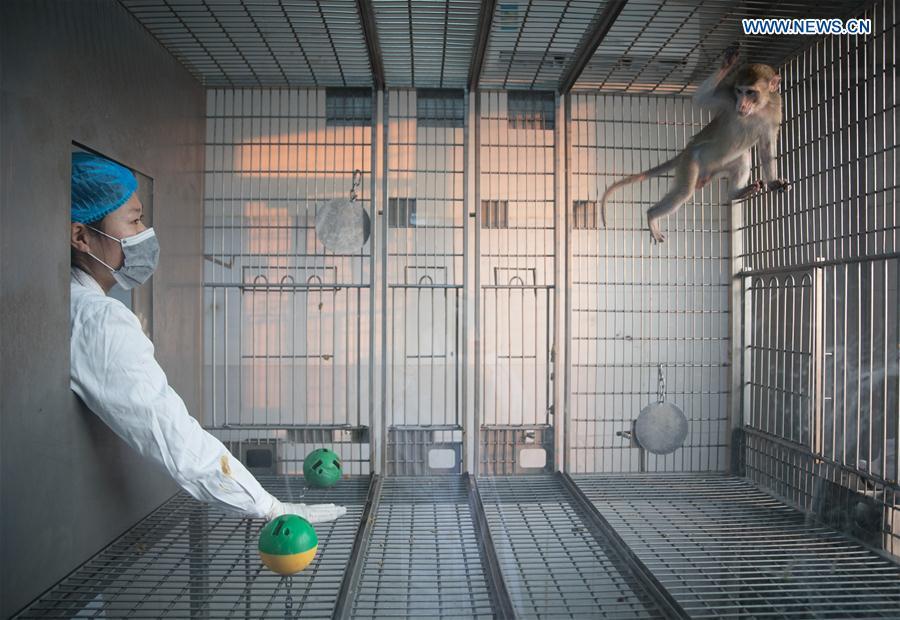
A gene-edited macaque which researchers knocked out BMAL1, a core circadian regulatory transcription factor, interacts with a staff member at the Institute of Neuroscience of Chinese Academy of Sciences in Shanghai, east China, Jan. 22, 2019. China has cloned five monkeys from a gene-edited macaque with circadian rhythm disorders, the first time multiple monkeys have been cloned from a gene-edited monkey for biomedical research. Scientists made the announcement Thursday, with two articles published in National Science Review, a top Chinese journal in English. The cloned monkeys were born in Shanghai at Institute of Neuroscience of Chinese Academy of Sciences.(Xinhua/Jin Liwang)
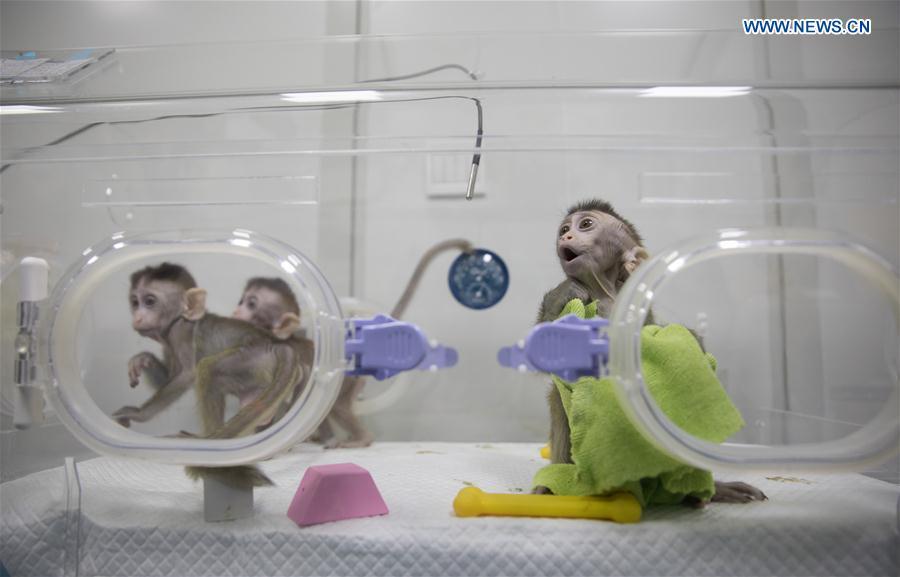
Photo taken on Jan. 22, 2019 shows the cloned monkeys with circadian rhythm disorders at the Institute of Neuroscience of Chinese Academy of Sciences in Shanghai, east China. China has cloned five monkeys from a gene-edited macaque with circadian rhythm disorders, the first time multiple monkeys have been cloned from a gene-edited monkey for biomedical research. Scientists made the announcement Thursday, with two articles published in National Science Review, a top Chinese journal in English. The cloned monkeys were born in Shanghai at Institute of Neuroscience of Chinese Academy of Sciences. (Xinhua/Jin Liwang)

Photo shows the National Science Review published on Jan. 24, 2019. China has cloned five monkeys from a gene-edited macaque with circadian rhythm disorders, the first time multiple monkeys have been cloned from a gene-edited monkey for biomedical research. Scientists made the announcement Thursday, with two articles published in National Science Review, a top Chinese journal in English. The cloned monkeys were born in Shanghai at Institute of Neuroscience of Chinese Academy of Sciences. (Xinhua/Institute of Neuroscience of Chinese Academy of Sciences)
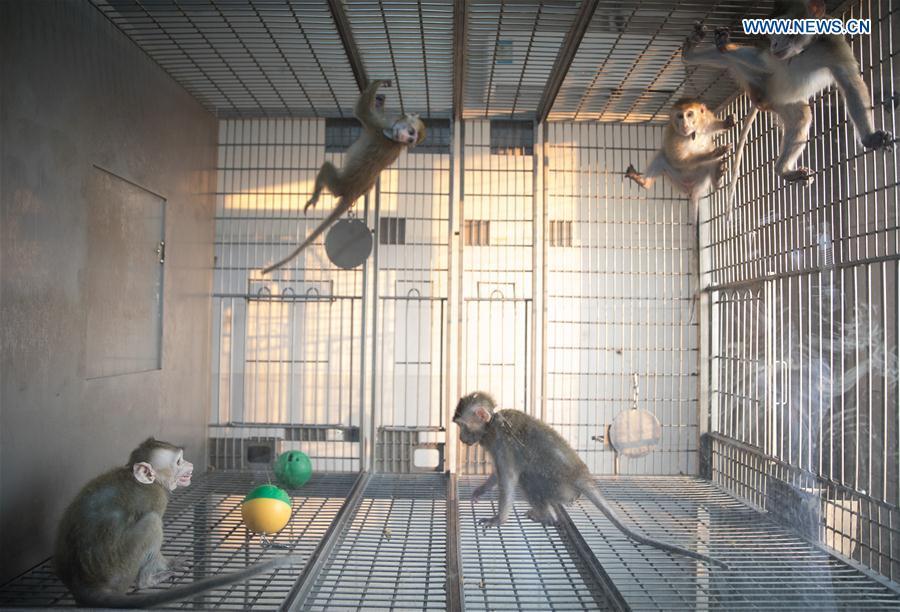
The gene-edited macaque with circadian rhythm disorders (lower left), from whom the five monkeys were cloned, is shown in the photo taken on Jan. 22, 2019 with other macaques which are knocked out the BMAL1, a core circadian regulatory transcription factor, at the Institute of Neuroscience of Chinese Academy of Sciences in Shanghai, east China. China has cloned five monkeys from a gene-edited macaque with circadian rhythm disorders, the first time multiple monkeys have been cloned from a gene-edited monkey for biomedical research. Scientists made the announcement Thursday, with two articles published in National Science Review, a top Chinese journal in English. The cloned monkeys were born in Shanghai at Institute of Neuroscience of Chinese Academy of Sciences. (Xinhua/Jin Liwang)

Researcher Zhang Hongjun (2nd R) discusses the experimental design with his team members at a laboratory of the Institute of Neuroscience of Chinese Academy of Sciences in Shanghai, east China, Jan. 22, 2019. China has cloned five monkeys from a gene-edited macaque with circadian rhythm disorders, the first time multiple monkeys have been cloned from a gene-edited monkey for biomedical research. Scientists made the announcement Thursday, with two articles published in National Science Review, a top Chinese journal in English. The cloned monkeys were born in Shanghai at Institute of Neuroscience of Chinese Academy of Sciences. (Xinhua/Jin Liwang)
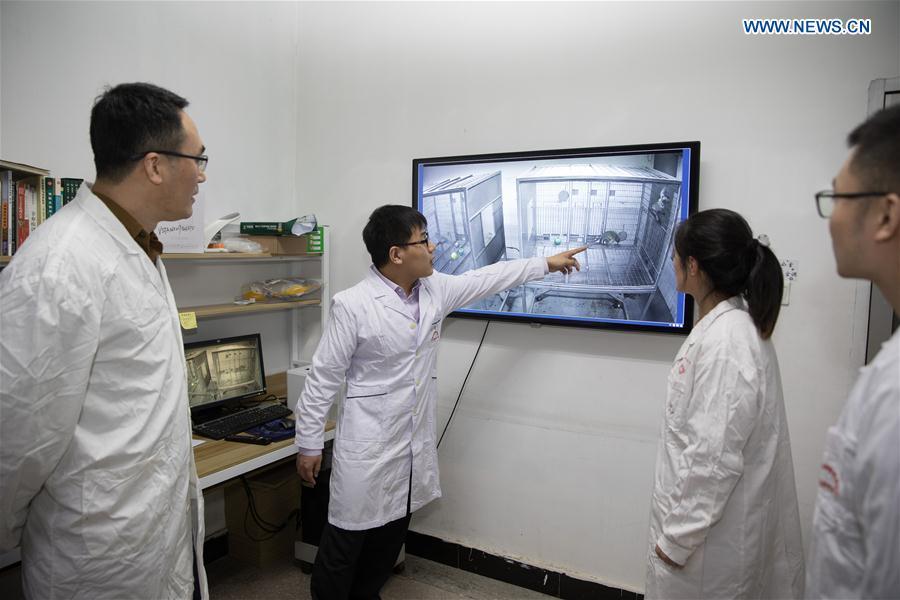
Researchers Sun Qiang (1st L) and Liu Zhen (2nd L) discuss recent situations of the cloned monkeys with their team members at the Institute of Neuroscience of Chinese Academy of Sciences in Shanghai, east China, Jan. 22, 2019. China has cloned five monkeys from a gene-edited macaque with circadian rhythm disorders, the first time multiple monkeys have been cloned from a gene-edited monkey for biomedical research. Scientists made the announcement Thursday, with two articles published in National Science Review, a top Chinese journal in English. The cloned monkeys were born in Shanghai at Institute of Neuroscience of Chinese Academy of Sciences. (Xinhua/Jin Liwang)
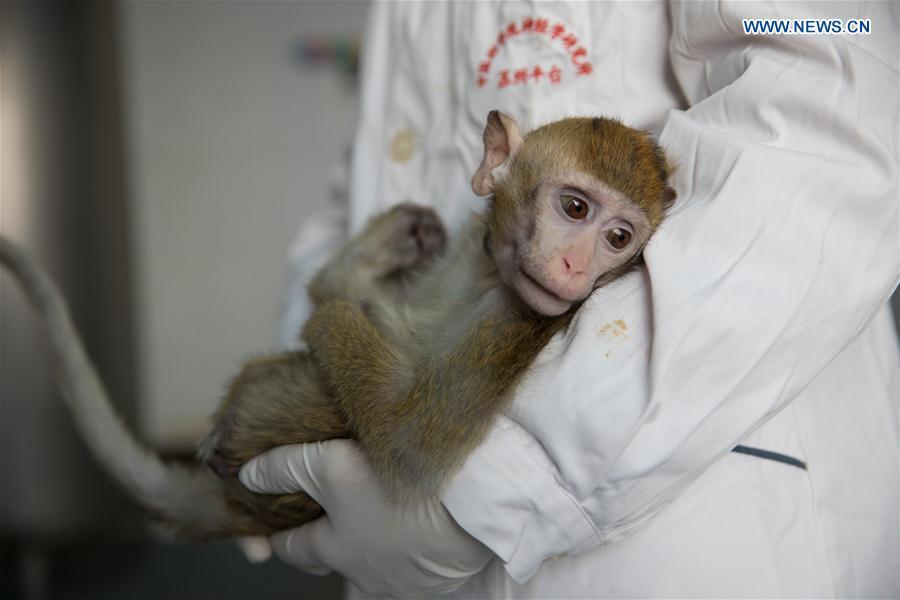
Photo taken on Jan. 22, 2019 shows the gene-edited macaque with circadian rhythm disorders, from whom the five monkeys were cloned, at the Institute of Neuroscience of Chinese Academy of Sciences in Shanghai, east China. China has cloned five monkeys from a gene-edited macaque with circadian rhythm disorders, the first time multiple monkeys have been cloned from a gene-edited monkey for biomedical research. Scientists made the announcement Thursday, with two articles published in National Science Review, a top Chinese journal in English. The cloned monkeys were born in Shanghai at Institute of Neuroscience of Chinese Academy of Sciences. (Xinhua/Jin Liwang)
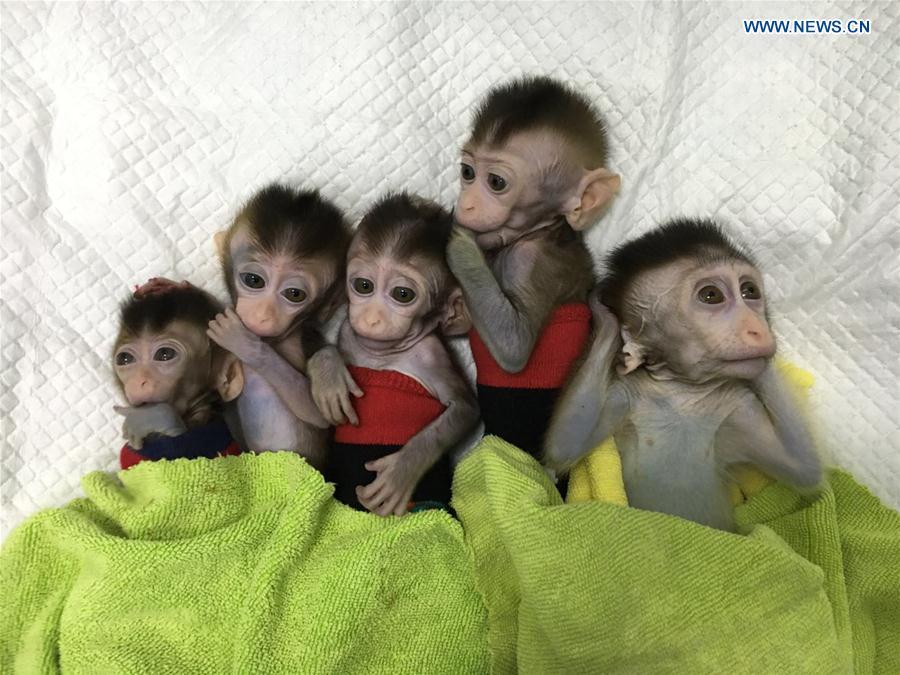
Photo taken on Nov. 27, 2018 shows the five cloned monkeys with circadian rhythm disorders. China has cloned five monkeys from a gene-edited macaque with circadian rhythm disorders, the first time multiple monkeys have been cloned from a gene-edited monkey for biomedical research. Scientists made the announcement Thursday, with two articles published in National Science Review, a top Chinese journal in English. The cloned monkeys were born in Shanghai at Institute of Neuroscience of Chinese Academy of Sciences. (Xinhua/Institute of Neuroscience of Chinese Academy of Sciences)
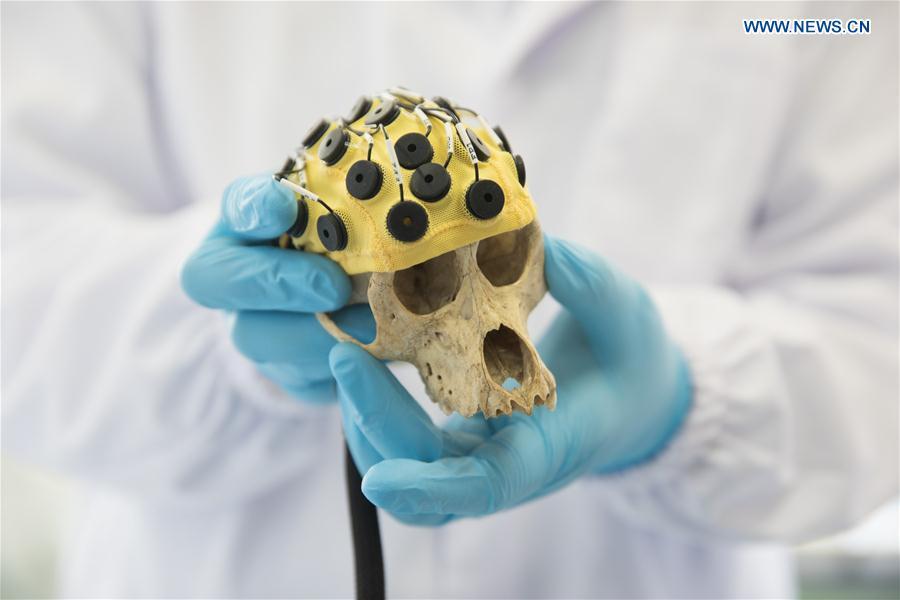
Researcher Zhang Hongjun discusses the experimental design with his team members at a laboratory of the Institute of Neuroscience of Chinese Academy of Sciences in Shanghai, east China, Jan. 22, 2019. China has cloned five monkeys from a gene-edited macaque with circadian rhythm disorders, the first time multiple monkeys have been cloned from a gene-edited monkey for biomedical research. Scientists made the announcement Thursday, with two articles published in National Science Review, a top Chinese journal in English. The cloned monkeys were born in Shanghai at Institute of Neuroscience of Chinese Academy of Sciences. (Xinhua/Jin Liwang)















